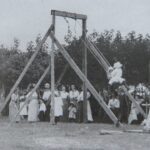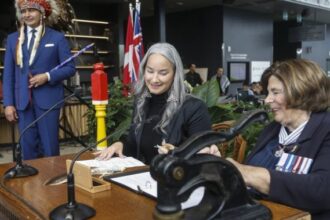In a contentious development that has intensified Alberta’s ongoing culture war, the province’s transgender sports policy contains a significant exemption that allows out-of-province transgender female athletes to compete in women’s categories during tournaments hosted in Alberta. This revelation has raised questions about the policy’s consistency and implementation just days after Premier Danielle Smith announced the controversial measures.
The policy, which took effect Monday, prohibits transgender females who have gone through male puberty from competing in women’s sports categories in Alberta. However, government officials confirmed to CO24 News that visiting athletes from other provinces or countries will be exempt from these restrictions when participating in competitions held on Alberta soil.
“The focus of our policy is on Alberta athletes and Alberta sporting organizations,” said Joseph Dow, spokesperson for Alberta’s Ministry of Culture. “We cannot enforce our policies on other jurisdictions, but we can ensure Alberta’s sporting organizations have the tools they need to protect women’s sports in our province.”
This exemption creates a paradoxical situation where Alberta’s transgender female athletes face restrictions that don’t apply to competitors visiting from elsewhere, potentially creating uneven playing fields at home tournaments. Critics argue this undermines the policy’s stated goal of ensuring fair competition.
The policy has already drawn fierce criticism from human rights advocates and LGBTQ+ organizations. Kristopher Wells, Canada Research Chair for the Public Understanding of Sexual and Gender Minority Youth, told CO24 Politics that the exemption “demonstrates the inherent contradictions and flawed thinking behind this policy.”
“If this was truly about protecting fairness in women’s sports, as the government claims, why would they allow transgender athletes from other jurisdictions to compete? This reveals that the policy is more about politics than protecting athletes,” Wells said.
Meanwhile, national sporting bodies have expressed concerns about potential conflicts between provincial and national policies. Many national organizations follow Olympic guidelines, which permit transgender female athletes to compete if they maintain specified testosterone levels over time.
Premier Smith defended the policy during a press conference Tuesday, saying it aims to protect women’s sports while being “as fair and as balanced as possible.” Smith added that the government consulted with sports organizations before implementing the measures, though several provincial sports bodies have disputed the extent of this consultation.
The policy also establishes separate competitive categories for transgender athletes in cases where sufficient participation numbers exist. However, critics note this approach may be impractical for many sports with limited transgender participation.
Legal experts interviewed by CO24 Canada suggest the policy could face challenges under Canada’s Charter of Rights and Freedoms. “This creates a two-tiered system where athletes are treated differently based on residency, which raises additional constitutional questions beyond the already problematic aspects of the policy,” said constitutional lawyer Patricia Johnson.
For transgender athletes like Emily Chen, a 19-year-old swimmer from Edmonton, the policy’s implications are deeply personal. “I’ve trained for years following all the rules set by swimming organizations, maintaining hormone levels as required. Now I’m told I can’t compete in my home province, but someone from British Columbia with the exact same circumstances can. How is that fair?” she told CO24 News.
As Alberta implements this policy, other provinces are watching closely. Saskatchewan has indicated it may follow Alberta’s approach, while Ontario and British Columbia have reaffirmed their commitment to more inclusive policies aligned with national sporting bodies.
As this divisive issue continues to unfold, the fundamental question remains: can policies that treat athletes differently based on geographic origin truly deliver the fairness and consistency that competitive sports demand?

























